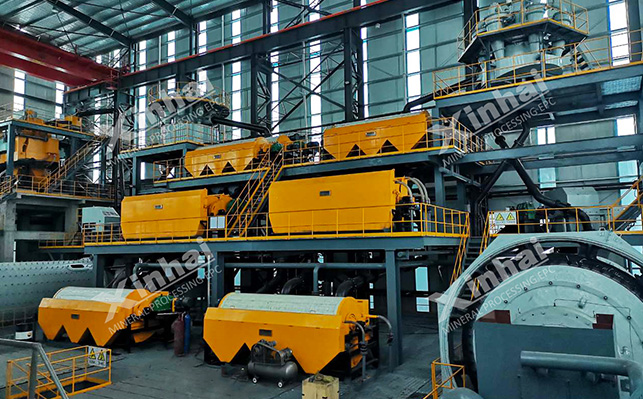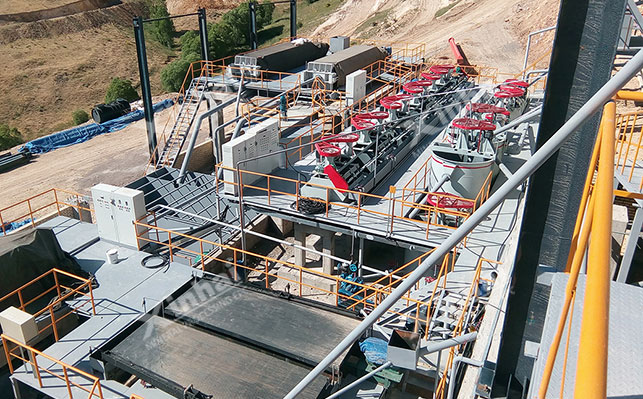In the field of ilmenite beneficiation, a single beneficiation method often has certain limitations, and the combined separation method that combines multiple methods can usually achieve better results and greatly improve the grade and recovery rate of the ore. At present, the combined separation methods used for ilmenite can be roughly divided into four types, namely magnetic separation + flotation, gravity separation + flotation, magnetic separation + gravity separation, gravity separation-magnetic separation-flotation-electric separation, etc.

In the ilmenite beneficiation work, the recovery of fine particles has always been a difficult problem. Flotation can, to a certain extent, realize the recovery of ilmenite with a particle size of less than 0.02 mm, but there are often many gangue minerals such as quartz in the concentrate powder after flotation, which seriously affects the flotation quality. To solve this problem, the ore can be magnetically separated before flotation.
Magnetic separation is a method of separation using the magnetic difference of minerals. Ilmenite has a certain magnetic property. Through magnetic separation, a part of the mineral aggregate containing ilmenite can be initially separated, and some gangue minerals with weak or no magnetic properties can be removed. This can reduce the processing volume of subsequent flotation and improve the efficiency of flotation.
The combination of magnetic separation and flotation can give full play to the advantages of the two methods. Magnetic separation can remove most of the magnetic gangue minerals and provide purer raw materials for flotation; flotation can further improve the grade of ilmenite and remove some non-magnetic gangue minerals. After the combination of the two, the grade of the concentrate produced and the total recovery rate will be greatly improved compared with single magnetic separation or flotation.

Gravity separation and flotation are both commonly used mineral processing methods, each with different characteristics. Gravity separation is a method of separation based on the density difference of minerals, which is suitable for processing coarse and medium-grained minerals. Flotation is a method of separation based on the wettability difference of the mineral surface, which has a better effect on the processing of fine-grained minerals.
The gravity-flotation process is used to recover ilmenite, which has a good selection effect for ilmenite with a grade of less than 6%. First, gravity separation is carried out to separate the denser ilmenite from the less dense gangue minerals by gravity. After gravity separation, the grade of ilmenite can be directly increased to more than 30%.
Then flotation desulfurization and other processes are carried out. Flotation can remove some sulfide minerals associated with ilmenite and improve the quality of the concentrate. At the same time, the grade of ilmenite can be further improved by reasonably selecting flotation reagents and optimizing flotation process parameters. The final grade of the titanium concentrate can reach 47%, and the recovery rate is close to 30%.
In addition, sulfur concentrate with a grade of 40% can also be produced in this process, realizing the comprehensive utilization of resources. This method not only improves the grade and recovery rate of ilmenite, but also recovers other valuable minerals, improving the utilization rate of resources.
For ilmenite, single gravity separation or magnetic separation can complete the task of concentration, but the magnetic-gravity combined process is undoubtedly better. The combination of gravity separation and magnetic separation can give full play to the advantages of the two methods, improve the efficiency of mineral processing, reduce production costs, and increase benefits.
Gravity separation can process coarser-grained minerals and has a better separation effect on some dense ilmenite mineral aggregates. Magnetic separation can remove some magnetic gangue minerals and further improve the grade of ilmenite.
Using the combined method of magnetic separation + gravity separation, the grade of the concentrate obtained can reach 50% and the recovery rate can reach 80%. This combined process has achieved good results in practical applications. For example, in a ilmenite beneficiation plant, magnetic gangue minerals are first removed by magnetic separation, and then gravity separation is performed to separate ilmenite from other minerals by gravity. After this combined process, the grade and recovery rate of the concentrate have been significantly improved, and the production cost has also been reduced, bringing greater economic benefits to the enterprise.
When the gangue in the ore is mainly composed of titanium pyroxene and plagioclase, and contains sulfide minerals, the combined method of gravity separation, magnetic separation, flotation and electrostatic separation can be used for ore dressing. This combined process can give full play to the advantages of various ore dressing methods and better improve the grade and utilization rate of the ore.
4.1. First, gravity separation is carried out to discard gangue minerals with lower density such as plagioclase. Gravity separation can handle coarser-grained minerals and separate minerals of different densities by gravity. After discarding plagioclase, the amount of minerals to be processed later can be reduced, and the ore dressing efficiency can be improved.
4.2. Then flotation desulfurization operation is carried out. Flotation can remove sulfide minerals associated with ilmenite and improve the quality of concentrate. By reasonably selecting flotation reagents and optimizing flotation process parameters, sulfide minerals can be effectively removed, so that ilmenite can be further enriched.
4.3. Finally, electrostatic separation is carried out to remove titanium pyroxene. Electrostatic separation is a method of separation using the difference in conductivity of minerals. Titanium pyroxene and ilmenite have different electrical conductivity. Titanium pyroxene can be removed by electrostatic separation to improve the grade of the concentrate.
This combined method of gravity separation-magnetic separation-flotation-electrostatic separation also has a good effect on low-grade ilmenite. Through a series of mineral processing processes, gangue minerals can be effectively removed to improve the grade and recovery rate of ilmenite. For example, in a low-grade ilmenite beneficiation plant, this combined process is used for mineral processing. After multiple links such as gravity separation, magnetic separation, flotation and electrostatic separation, the grade of ilmenite has been significantly improved, and the recovery rate has also been greatly improved, which has achieved efficient resource utilization for the enterprise.